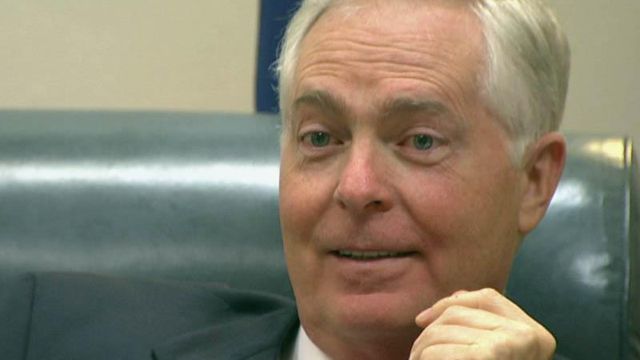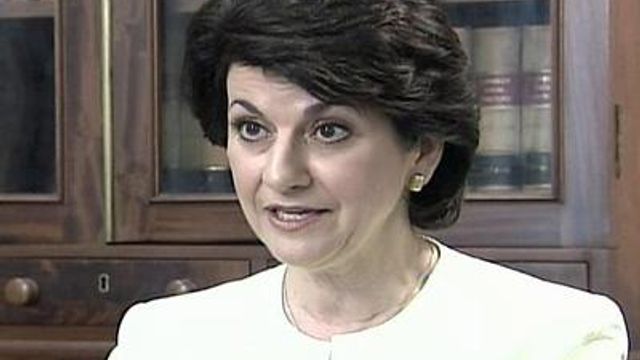Mary Easley defends 88 percent pay increase
First Lady Mary Easley brushes off criticism of a new contract with N.C. State that pays her $170,000 a year.
Posted — Updated"Negative stories and exaggerations and partial stories go with the territory, and that's part of public life," she said in an interview with WRAL.
Easley has been an executive-in-residence and senior lecturer at N.C. State for the past three years, developing a speakers program and teaching a graduate course in public administration and courses in the Administrative Officers Management Program, which provides leadership training to law enforcement officers.
Her previous salary was $90,300 a year, but that increased Tuesday to $170,000 a year – an 88 percent increase – as part of a five-year contract.
Provost Larry Nielsen said in a statement that Easley's salary "is within the range of similar management and law faculty and administrators at N.C. State and other universities."
A full-time professor at N.C. State earns an average of $110,790.
"Mary Easley brings unmatched experience to our students at N.C. State, and we are fortunate to have her as a member of our faculty,” Nielsen said. "Under her direction, the university's Millennium Seminar Series has been extraordinarily successful in hosting nationally known speakers on campus four times each year."
In addition to her previous duties, Easley will begin expanding the Public Safety Leadership Initiative to include first responders and security professionals. The initiative includes the Administrative Officers Management Program and the Law Enforcement Executive Program, which provides top law enforcement officers with management training.
She also will co-direct pre-law services at N.C. State and become the university's liaison with area law firms and law schools at other universities as she develops a dual degree program.
"Mrs. Easley's experience in the legal profession and commitment to public service make her uniquely qualified to direct these efforts at N.C. State,” Nielsen said.
State workers, including N.C. State employees, will likely receive a 2.75 percent raise, or $1,100, once the General Assembly approves the new state budget. Gov. Mike Easley had proposed giving state workers a 1.5 percent plan in his budget plan.
"I think the average rank-and-file state employee is going to be beside themselves and just feel like this is one more slap in the face," said Ardis Watkins, director of legislative affairs for the State Employees Association of North Carolina. "(An) 88 percent raise when state employees were suggested by the governor to get 1.5 percent is just preposterous."
Bob Hall, executive director of government watchdog group Democracy North Carolina, said the timing of the raise is pretty embarrassing for the Easleys.
"It just highlights the disparity and sort of arbitrary way money gets allocated here and there," Hall said. "We need to have rules and standards for how money gets spent, so there's not favoritism."
The Easleys said they couldn't understand the uproar over her salary.
"It's not a raise. She's taking a new position," the governor said. "She could go out with a law firm and make a lot more money, but she's decided to stay with public service."
"I certainly didn't want a conflict with my husband's endeavors, but I've got plenty of energy left," Mary Easley said. "What people have to understand is that I bring something unique to N.C. State."
The governor said he senses sexism in the critics of his wife's success.
"If she were a man, it wouldn't be an issue," he said.
The Easleys have come under fire recently for taking taxpayer-funded trips to Europe in recent years.
They spent more than $100,000 during an April trip to Italy sponsored by the state Department of Commerce. Mary Easley accompanied state Department of Cultural Resources officials on trips to France last year and to Russia and Estonia in May that cost another $109,000.
The governor on Tuesday defended the cost of the overseas travel, saying the trips were necessary to promote North Carolina to European businesses, arts officials and tourists.
"I wish (the trips) didn't cost so much, but let's be honest about it, a cheeseburger and onion rings is $60 over (in Europe)," he said. "The dollar's very, very weak now, and that is why we were over there – to get those euros coming to the United States."
• Credits
Copyright 2024 by Capitol Broadcasting Company. All rights reserved. This material may not be published, broadcast, rewritten or redistributed.






